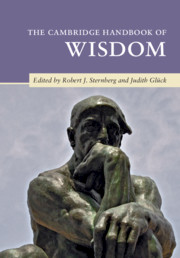Book contents
- The Cambridge Handbook of Wisdom
- The Cambridge Handbook of Wisdom
- Copyright page
- Dedication
- Contents
- Figures
- Tables
- Contributors
- Preface
- Part I Foundations of Wisdom
- Part II Conceptions of Wisdom
- Part III Measures of Wisdom
- Part IV The Development of Wisdom
- Part V Cultural Perspectives on Wisdom
- 18 Cultural Differences in Wisdom and Conceptions of Wisdom
- 19 Non-Western Lay Conceptions of Wisdom
- Part VI Wisdom and Other Psychological Constructs
- Part VII Wisdom in Action
- Part VIII Conclusions
- Index
- References
18 - Cultural Differences in Wisdom and Conceptions of Wisdom
from Part V - Cultural Perspectives on Wisdom
Published online by Cambridge University Press: 15 March 2019
- The Cambridge Handbook of Wisdom
- The Cambridge Handbook of Wisdom
- Copyright page
- Dedication
- Contents
- Figures
- Tables
- Contributors
- Preface
- Part I Foundations of Wisdom
- Part II Conceptions of Wisdom
- Part III Measures of Wisdom
- Part IV The Development of Wisdom
- Part V Cultural Perspectives on Wisdom
- 18 Cultural Differences in Wisdom and Conceptions of Wisdom
- 19 Non-Western Lay Conceptions of Wisdom
- Part VI Wisdom and Other Psychological Constructs
- Part VII Wisdom in Action
- Part VIII Conclusions
- Index
- References
Summary
- Type
- Chapter
- Information
- The Cambridge Handbook of Wisdom , pp. 409 - 428Publisher: Cambridge University PressPrint publication year: 2019
References
- 8
- Cited by

